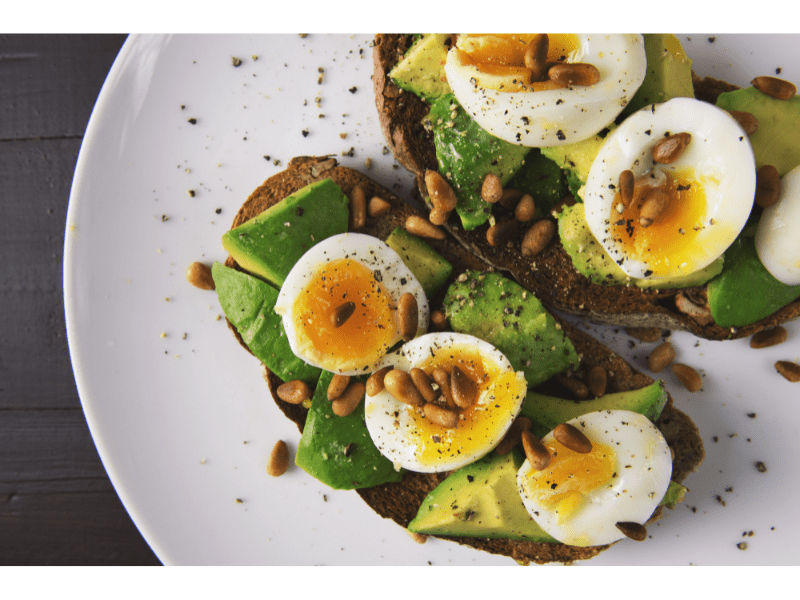The Controversy Surrounding Eggs and Weight Loss
The relationship between eggs and weight loss has been a subject of controversy and debate in the health and fitness community. Some claim that eggs are a superfood that can aid in shedding those extra pounds, while others argue that they can hinder weight loss efforts. This controversy has given rise to various diets such as the egg diet or boiled egg diet, which propose consuming eggs as a primary component for rapid weight loss.
However, it is important to separate fact from fiction when it comes to the myth surrounding eggs and weight loss. In this section, we will delve into the scientific evidence and explore whether eggs truly have a positive impact on weight management or if the claims surrounding them are merely unfounded assumptions.
By examining the latest research and expert opinions, we aim to provide you with a comprehensive understanding of the role that eggs play in achieving sustainable weight loss. So let’s dive into this controversial topic and uncover the truth behind the relationship between eggs and weight management.
Table of Contents
The Nutritional Composition of Eggs: A Powerhouse for Weight Management
Eggs have long been hailed as a nutritional powerhouse, and for good reason. When it comes to weight management, eggs are an excellent choice due to their impressive nutritional composition.
First and foremost, eggs are a fantastic source of protein. In fact, they contain all nine essential amino acids that our bodies need for optimal health. Protein is known to be highly satiating, meaning it keeps us feeling full and satisfied for longer periods of time. This can be incredibly beneficial for those looking to manage their weight or even shed a few pounds.

Moreover, eggs are low in calories while being packed with essential nutrients. They provide a wide range of vitamins such as vitamin A, vitamin D, vitamin B12, and folate. Additionally, they are rich in minerals like iron and selenium.
Contrary to popular belief, the egg yolk holds significant benefits as well. It contains healthy fats that aid in the absorption of fat-soluble vitamins present in the egg. The yolk also contains choline, which plays a crucial role in brain health and function.
Incorporating eggs into your diet can be an effective strategy for weight management due to their high protein content, low calorie count, and array of essential nutrients. Whether you enjoy them boiled, scrambled or poached – eggs truly are nature’s gift when it comes to maintaining a healthy weight while nourishing your body with vital nutrients.
- High Protein Content in Eggs:
Eggs, often hailed as a nutritional powerhouse, are not only delicious but also packed with high-quality protein. If you’re looking to incorporate more protein into your diet, eggs are an excellent choice.
When it comes to weight loss, protein plays a crucial role. It helps to keep you feeling full and satisfied for longer periods, reducing the chances of overeating or snacking on unhealthy foods. By including eggs in your meals, you can increase your protein intake and support your weight loss goals.
Protein is essential for overall health and wellbeing. It is the building block of cells and tissues in our body and plays a vital role in repairing and maintaining them. Including enough protein in your diet is necessary for muscle growth, immune function, hormone production, and many other important bodily processes.
Eggs are not only rich in protein but also provide essential nutrients like vitamins A, D, E, B12, choline, and minerals such as iron and zinc. They are a versatile ingredient that can be enjoyed in various ways – boiled, scrambled or incorporated into dishes like omelettes or frittatas.
In conclusion, if you’re aiming to increase your protein intake or looking for a nutritious addition to your diet plan for weight loss purposes, eggs should definitely be on your radar. With their high protein content and numerous health benefits, they are an excellent choice for those seeking a healthy lifestyle.
- Satiety Factor: How Eggs Can Help You Feel Fuller for Longer
When it comes to feeling full and satisfied, eggs have a remarkable satiety factor. This means that consuming eggs can help you feel fuller for longer periods of time, even with fewer calories.
Eggs are known to be excellent appetite suppressants due to their high protein content. Protein is a macronutrient that takes longer to digest compared to carbohydrates or fats, which means it stays in your stomach for a longer period of time, keeping you feeling satisfied and less likely to snack on unhealthy foods.
Research has shown that starting your day with an egg-based breakfast can lead to reduced calorie intake throughout the day. In fact, studies have indicated that individuals who consume eggs for breakfast tend to eat fewer calories during subsequent meals compared to those who opt for other breakfast options.
The satiety factor of eggs can be attributed not only to their protein content but also their nutrient density. Eggs are packed with essential vitamins and minerals that contribute towards overall health and well-being.
So if you’re looking for a way to curb your appetite and maintain a healthy weight, incorporating eggs into your diet can be an effective strategy. With their ability to keep you feeling full for longer periods of time while providing essential nutrients, eggs truly deserve their reputation as a satisfying and nourishing food choice.
- Nutrient Density: Packed with Essential Vitamins and Minerals
When it comes to nutrient density, eggs are a powerhouse of essential vitamins and minerals. Packed with goodness, they offer a wide range of nutritional benefits that can support weight loss and overall health.
Eggs are known for their high vitamin content. They are an excellent source of vitamins such as vitamin A, vitamin D, vitamin E, and B-complex vitamins like B12 and folate. These vitamins play a crucial role in various bodily functions, including immune system support, energy production, and healthy cell growth.
In addition to vitamins, eggs are also rich in minerals that our bodies need to function optimally. They contain minerals like iron, zinc, selenium, and phosphorus. Iron is essential for carrying oxygen throughout the body while zinc supports immune function. Selenium acts as an antioxidant protecting cells from damage while phosphorus is vital for bone health.
One of the great advantages of including eggs in your weight loss journey is their nutrient density. They provide a significant amount of nutrition while being relatively low in calories. This means you can enjoy the benefits of essential vitamins and minerals without compromising your calorie intake.
A eggs are not only delicious but also offer an array of essential nutrients that can contribute to weight loss efforts and overall well-being. By incorporating them into your diet regularly, you can ensure that you’re getting the necessary vitamins and minerals your body needs to thrive.
The Role of Eggs in Different Weight Loss Diets
Eggs have long been recognized as a versatile and nutritious food, and their role in weight loss diets is no exception. The egg diet for weight loss has gained popularity due to its simplicity and effectiveness. By incorporating eggs into low-carb diets, individuals can experience significant weight loss while still enjoying a satisfying and nutrient-rich meal plan.
One of the most well-known variations of the egg diet is the boiled egg diet plan. This plan typically involves consuming a specific number of boiled eggs per day, along with other low-carb foods such as vegetables and lean proteins. The high protein content in eggs helps to promote feelings of fullness and reduces cravings, making it easier to adhere to the diet.

In addition to being low in carbohydrates, eggs are also packed with essential vitamins and minerals that support overall health. They are an excellent source of quality protein, which aids in muscle growth and repair. Furthermore, eggs contain healthy fats that contribute to satiety and help regulate blood sugar levels.
Incorporating eggs into low-carb diets provides numerous benefits beyond weight loss. They can be prepared in various ways, adding variety to meals while keeping them nutritious. Whether scrambled, poached, or made into omelets with vegetables, eggs offer endless possibilities for creating delicious dishes that align with weight loss goals.
When considering different weight loss diets, it is important to recognize the valuable role that eggs play. Their versatility, nutritional profile, and ability to satisfy hunger make them an ideal addition for those seeking effective ways to shed pounds while maintaining a balanced eating plan.
- The Boiled Egg Diet:
The Boiled Egg Diet has gained significant attention in recent years as a popular weight loss method. This diet plan revolves around the consumption of boiled eggs as the main source of nutrition. By following a specific meal plan, individuals aim to achieve quick and effective weight loss results.
One of the key factors that make the Boiled Egg Diet attractive is its simplicity. With a straightforward meal plan, it eliminates the need for complex calorie counting or restrictive food choices. The focus on boiled eggs provides a high protein intake while keeping calories low.
Many individuals have reported positive results and reviews after following the Boiled Egg Diet. They claim to have experienced significant weight loss within a short period of time. However, it is important to note that individual results may vary and sustainable weight loss requires long-term lifestyle changes.
While the Boiled Egg Diet offers potential benefits, there are certain restrictions that need to be considered. It is essential to consult with a healthcare professional before starting any new diet plan, especially if you have any underlying health conditions or dietary restrictions. Additionally, this diet may not provide all necessary nutrients for long-term health and should not be followed for an extended period without proper guidance.
The Boiled Egg Diet offers a simple approach to weight loss with reported positive results from many individuals. However, it is crucial to prioritize overall health and seek professional advice before embarking on any restrictive diet plan like this one.
- Including Eggs in Other Popular Diets:
Eggs have long been a staple in many popular diets, including the keto diet, low-carb diet, and paleo diet. Their versatility and nutritional value make them an excellent addition to these eating plans.
For those following a keto diet, eggs are highly recommended due to their low carbohydrate content and high fat and protein content. They provide a satisfying and filling option for breakfast or any meal throughout the day. Whether scrambled, fried, or incorporated into recipes, eggs are a versatile ingredient that can be enjoyed while staying within the guidelines of the keto diet.
Similarly, eggs fit well into low-carb or paleo diets. These diets emphasize whole foods and limit processed carbohydrates. Eggs provide essential nutrients such as vitamins A, E, D, and B12 along with minerals like iron and zinc. They also contain healthy fats that support brain function and satiety.
Incorporating eggs into these popular diets allows individuals to enjoy a variety of meals while maintaining their dietary restrictions. From omelets packed with vegetables to egg-based casseroles or frittatas, there are countless ways to incorporate eggs into these eating plans without sacrificing taste or nutrition.
By including eggs in keto, low-carb, or paleo diets, individuals can benefit from their nutrient density while enjoying delicious meals that align with their dietary goals. Whether you’re looking for a protein-packed breakfast option or an ingredient to enhance your favorite recipes, eggs are a versatile choice that complements these popular diets perfectly.
Practical Tips are eggs good for weight loss Meal Plan
Incorporating eggs into a weight loss meal plan can be a smart and delicious choice. Not only are eggs packed with essential nutrients, but they also provide a sense of satiety that can help control cravings and promote weight loss. With the right portion control and cooking methods, eggs can be a versatile ingredient to enhance your healthy eating journey.
When it comes to healthy egg recipes for weight loss, it’s important to focus on nutrient-dense options that are low in calories. Try starting your day with a veggie-packed omelette or scrambled eggs using minimal oil or butter. This way, you can enjoy a satisfying breakfast without compromising your calorie intake.
For lunch or dinner, consider incorporating hard-boiled eggs into salads or making egg-based dishes like frittatas or crustless quiches. These options allow you to add protein-rich ingredients while keeping the overall calorie count in check.
Portion control is key when including eggs in your meals for weight loss. Aim for one whole egg and two egg whites as a serving size to keep the calorie content moderate while still reaping the benefits of protein and nutrients.
When it comes to cooking methods, opt for healthier alternatives such as boiling, poaching, or baking instead of frying. By avoiding excessive oil or butter during cooking, you can reduce unnecessary calories while maintaining the nutritional value of the eggs.
Incorporating eggs into your weight loss meal plan doesn’t have to be complicated. With these practical tips in mind – focusing on healthy recipes, portion control, and mindful cooking methods – you can enjoy the benefits of this versatile ingredient while working towards your weight loss goals.
Eggs, a Nutrient-Packed Addition to Your Weight Loss Journey

In conclusion, eggs are a nutrient-packed addition to your weight loss journey. Despite the myths surrounding eggs and weight gain, studies have consistently shown that incorporating eggs into your diet can actually aid in weight loss.
Eggs are low in calories and high in protein, making them a satisfying and filling food choice. They also contain essential nutrients such as vitamins A, D, E, and B12, as well as minerals like iron and zinc. These nutrients not only support overall health but also help to maintain energy levels during weight loss.
Furthermore, eggs have been found to increase feelings of fullness and reduce appetite. This can lead to a decrease in calorie intake throughout the day, ultimately supporting weight loss efforts.
It is important to debunk the myths that associate eggs with weight gain. Research has consistently shown that dietary cholesterol from foods like eggs does not significantly impact blood cholesterol levels or increase the risk of heart disease for most people.
Incorporating eggs into your weight loss journey can provide numerous benefits without compromising your health. Whether you enjoy them boiled, scrambled or poached, make sure to include this nutrient-packed food in your diet for successful and sustainable weight loss results.
Also Read: A Beginner’s Guide To Healthy Meal Plans For Weight Loss

